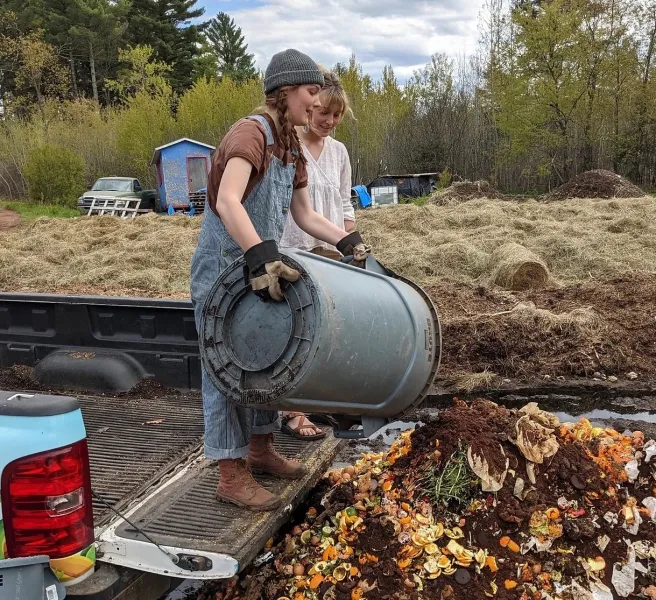As part of Northern Michigan University's commitment to sustainability, Dining Services has been partnering with Partridge Creek Farm and its newer sister company, Partridge Creek Compost, to divert food waste from the university for use in creating compost.
Native soil in the Upper Peninsula is thin and rocky, so Partridge Creek Farm set out to manufacture its own vermicompost to obtain the best soil to help plants thrive in the challenging environment. Vermicompost results from earthworms and microorganisms helping to stabilize active organic materials such as food waste and convert them to a valuable soil amendment and plant nutrient source. The farm initially approached NMU Dining about contributing food waste to the effort.
“When you live somewhere very rural like Marquette, you have to help create a market for something,” said former NMU Executive Chef and NMU instructor Alden MacDonald. “How can we expect to have some sort of post-consumer composting site if there are no post-consumer composting products? That's what we're trying to do here. We have to set up a program that caters to both business sustainability and environmental sustainability.”
NMU Dining had been sending about two cubic yards of pre-consumer compost to the facility every week. That's 400 pounds of coffee grounds, eggshells, vegetable trimmings and other forms of food waste created before any interaction with the consumer.
Now Partridge Creek Compost has increased the capacity for waste diversion to include all of Marquette County, further solidifying the partnership with NMU Dining. PCC also sells vermicompost for gardens and lawns, with proceeds supporting the farm's educational efforts and—among other things—NMU internship programs.
The goal for NMU Dining is to upgrade the program to include post-consumer compostable items that can already be found around campus. MacDonald said these include the to-go sushi trays from Temaki and the single-use utensils, paper plates, napkins and dip cups.
“Most of the compostable single-use items are made out of corn, so they're plant-based, rather than regular plastic, which is made out of petroleum,” she said. “It's a more expensive option, but we know it is the more sustainable choice and a step in the right direction."
Dan Perkins, Partridge Creek Farm (PCF) founder, said, “There's a social and emotional side of getting to know your community, being a community member and the joy of helping each other out. As we've evolved into composting, we're trying to create a local circular waste system where we turn our waste into productive products that we can sell and help sustain our educational programs.”
PCF is also looking for help from NMU students and employees, along with the broader community, when it comes to composting. Perkins mentioned that post-consumer goods have the potential to bring in 60 to 90 yards of compostable materials if done to the maximum amount, but they can't just get that from Northern or local restaurants alone.
“It's incredibly important for the success of this program that we have faculty and students support in caring for where they're putting their waste,” said PCF Executive Director of Programs and Sponsorships May Tsupros. “This will only work if they're putting their waste in the right receptacles and being thoughtful about that. If even one person in the dining hall throws away their tray and there's a bunch of non-compostable recyclable stuff in it, that can create infinite amounts of work for us and sometimes create a non-viable product. However, we're really excited to endeavor this and to support NMU's mission of being a sustainable campus.”
To see what NMU is doing to become a more sustainable university, click here. Learn more about Partridge Creek Farm here and Partridge Creek Compost here.

